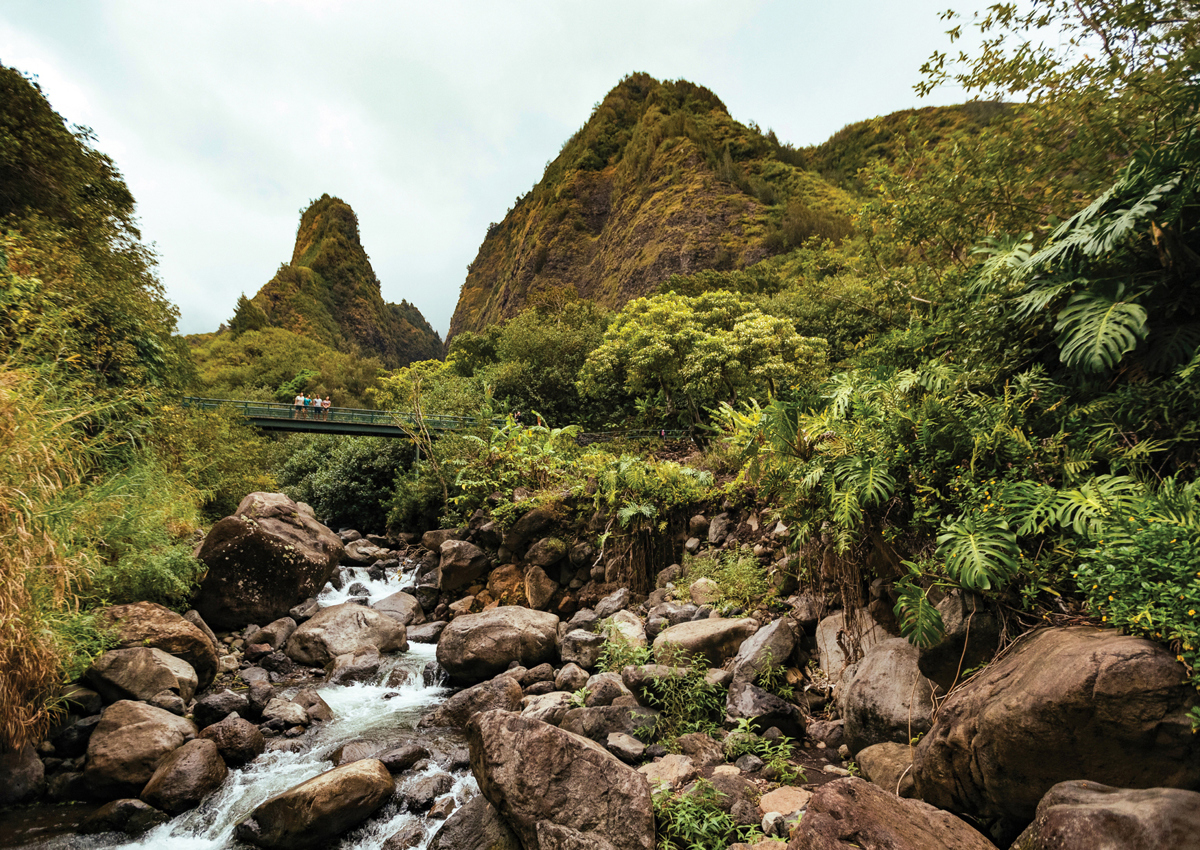Reservations Required at ‘Īao Valley State Monument Starting May 1

The State of Hawaiʻi’s Department of Land and Natural Resources (DLNR) recently announced that advanced reservations will be required for out-of-state visitors at the historic ʻĪao Valley State Monument on Maui effective May 1, 2023, when the park reopens following a nine-month closure for slope stabilization work.
The implementation of this system delivers on one of the community’s top priorities to manage tourism which residents articulated in the Maui Nui Destination Management Action Plan (DMAP). ʻĪao Valley State Monument will become the fourth state park requiring advance reservations. Non-resident reservations are already required at Waiʻānapanapa State Park on Maui, Hāʻena State Park on Kauaʻi, and Lēʻahi — Diamond Head State Monument on Oʻahu, as well as the City and County of Honolulu’s Hanauma Bay Nature Preserve.
“We have already seen the positive impacts of the State’s reservations systems at other parks across the state, and this new system at ʻĪao Valley State Monument will be instrumental in protecting the site’s natural and cultural resources while managing visitor capacity within the area,” said John De Fries, Hawaiʻi Tourism Authority’s (HTA) president and CEO. “Together with our industry partners and Global Marketing Team, we are urging visitors to plan ahead when booking their trips and become familiarized with the new process. Mahalo to DLNR for their longstanding partnership as we work together to steward and protect our wahi pana (legendary places) and improve the experience for everyone who visits.”
ʻĪao Valley is a place of deep importance. Rising 1,200 feet above the valley floor, Kūkaʻemoku (ʻĪao Needle) is intimately connected to Kanaloa, the spiritual force affecting the life, living creatures, and movements of the ocean. For generations, the remains of chiefs and priests were hidden in the valley to protect the mana (spiritual power) contained in their iwi (bones).
The valley is also site of a pivotal 1790 battle in the unification of the Hawaiian Islands. Kahekili ruled over the islands of Maui, Molokaʻi, Lānaʻi, Kahoʻolawe, and Oʻahu. His son Kalanikūpule led the forces defending Maui against the army of Kamehameha, the ascendant Hawaiʻi Island ruler who would go on to unite the islands into one kingdom. The intense battle was named Kepaniwai for the many fallen warriors who stopped the flow of the valley’s river.
The new reservation system will help mitigate environmental impacts in the valley caused by sustained foot traffic, while reducing vehicle congestion in the park and surrounding neighborhoods.
Advance reservations to enter ‘Īao Valley State Monument are now available online. All Hawai‘i State Parks day-use reservations can be made at gostateparks.hawaii.gov. The parking fee is $10 per vehicle. The additional non-resident entrance fee is $5 per person with no charge for children under three years of age. There are separate fees for commercial vehicles.
Hawaiʻi residents with a valid driver’s license or State identification will continue to access all of Hawaiʻi’s state parks free of charge, however entry may depend on parking availability. Out-of-state visitors entering the site with a Hawaiʻi resident must still have a reservation.
Action B.3 of the Maui Nui DMAP calls for the development of reservation systems to monitor and manage users at natural resource and cultural sites. Now in its third phase of implementation, the Maui Nui DMAP is a collaborative, community-based tourism management plan to rebuild, redefine and reset the direction of tourism on Maui. Developed by the residents of Maui, and in partnership with MVCB, DLNR and other state and county agencies, the visitor industry and community, the Maui Nui DMAP identifies areas of need as well as solutions for enhancing the residents’ quality of life and improving the visitor experience.
“We are grateful to DLNR for bringing this reservation system to fruition, to support the efforts to manage the flow of people in and out of ʻĪao Valley State Monument, and make the experience more enjoyable for all,” said Sherry Duong, executive director of Maui Visitors and Convention Bureau. “One of our collective DMAP goals is to create sustainable tourism management models that benefit our people and place. This is another step in the right direction.”
Travelers who are unable to obtain reservations for their desired day can visit GoHawaii.com/Maui to learn about other experiences and activities on Maui.
For more information on the ʻĪao Valley State Monument reservation system, visit dlnr.hawaii.gov/dsp/parks/maui/iao-valley-state-monument/.

